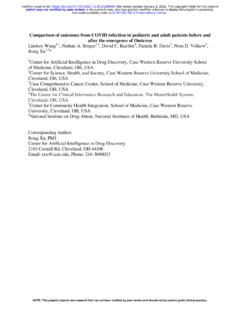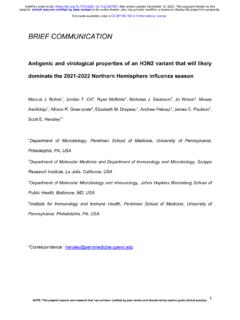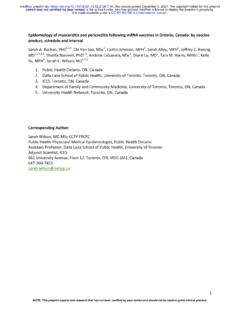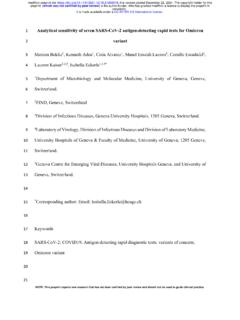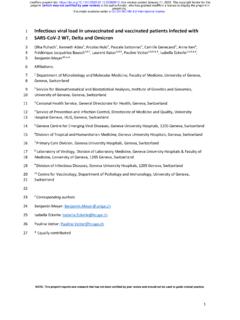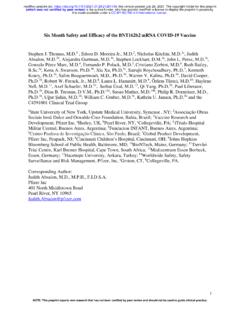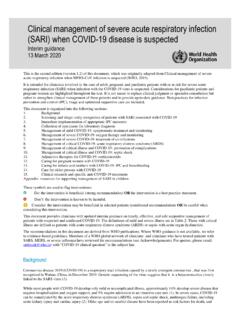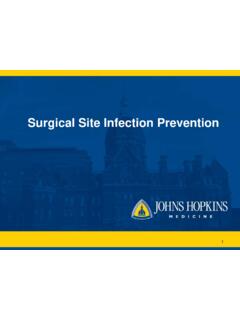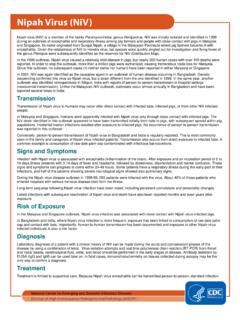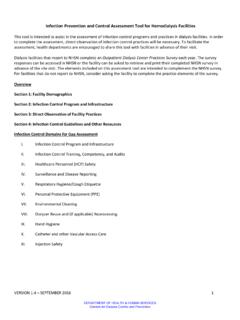Transcription of Protection afforded by prior infection against SARS-CoV-2 ...
1 1 Protection afforded by prior infection against SARS-CoV-2 reinfection with the Omicron variant Heba Altarawneh, MD1,2 , Hiam Chemaitelly, PhD1,2 , Patrick Tang, MD PhD3, Mohammad R. Hasan, PhD3, Suelen Qassim, MPH1,2, Houssein H. Ayoub, PhD4, Sawsan AlMukdad, MSc1,2, Hadi M. Yassine, PhD5,6, Fatiha M. Benslimane, PhD5,6, Hebah A. Al Khatib, PhD5,6, Peter Coyle, MD5,7,8, Zaina Al Kanaani, PhD7, Einas Al Kuwari, MD7, Andrew Jeremijenko, MD7, Anvar Hassan Kaleeckal, MSc7, Ali Nizar Latif, MD7, Riyazuddin Mohammad Shaik, MSc7, Hanan F. Abdul Rahim, PhD9, Gheyath K. Nasrallah, PhD5,6, Mohamed Ghaith Al Kuwari, MD10, Adeel A.
2 Butt, MBBS MS7,11, Hamad Eid Al Romaihi, MD12, Mohamed H. Al-Thani, MD12, Abdullatif Al Khal, MD7, Roberto Bertollini, MD MPH12, and Laith J. Abu-Raddad, PhD1,2,11,13* Both authors contributed equally. 1 Infectious Disease Epidemiology Group, Weill Cornell Medicine-Qatar, Cornell University, Doha, Qatar 2 World Health Organization Collaborating Centre for Disease Epidemiology Analytics on HIV/AIDS, Sexually Transmitted infections , and Viral Hepatitis, Weill Cornell Medicine Qatar, Cornell University, Qatar Foundation Education City, Doha, Qatar 3 Department of Pathology, Sidra Medicine, Doha, Qatar 4 Mathematics Program, Department of Mathematics, Statistics, and Physics, College of Arts and Sciences, Qatar University, Doha, Qatar 5 Biomedical Research Center, Member of QU Health.
3 Qatar University, Doha, Qatar 6 Department of Biomedical Science, College of Health Sciences, Member of QU Health, Qatar University, Doha, Qatar 7 Hamad Medical Corporation, Doha, Qatar 8 Wellcome-Wolfson Institute for Experimental Medicine, Queens University, Belfast, United Kingdom 9 College of Health Sciences, QU Health, Qatar University, Doha, Qatar 10 Primary Health Care Corporation, Doha, Qatar 11 Department of Population Health Sciences, Weill Cornell Medicine, Cornell University, New York, New York, USA 12 Ministry of Public Health, Doha, Qatar 13 Department of Public Health, College of Health Sciences, Member of QU Health, Qatar University, Doha, Qatar Word count: Abstract: 256 words, Main Text: 1,784 words.
4 Number of tables: 3 Number of figures: 4 *Correspondence to Professor Laith J. Abu-Raddad, E-mail: All rights reserved. No reuse allowed without permission. (which was not certified by peer review) is the author/funder, who has granted medRxiv a license to display the preprint in perpetuity. The copyright holder for this preprintthis version posted January 6, 2022. ; : medRxiv preprint NOTE: This preprint reports new research that has not been certified by peer review and should not be used to guide clinical Abstract BACKGROUND: Natural SARS-CoV-2 infection elicits strong Protection against reinfection with the Alpha ( ), Beta ( ), and Delta ( ) variants.
5 However, the Omicron ( ) variant harbors multiple mutations that can mediate immune evasion. We estimated effectiveness of prior infection in preventing reinfection (PES) with Omicron and other SARS-CoV-2 variants in Qatar. METHODS: PES was estimated using the test-negative, case-control study design, employing a methodology that was recently investigated and validated for derivation of robust estimates for PES. Cases (PCR-positive persons with a variant infection ) and controls (PCR-negative persons) were exact-matched by sex, 10-year age group, nationality, and calendar time of PCR test, to control for known differences in the risk of exposure to SARS-CoV-2 infection in Qatar.
6 RESULTS: PES against symptomatic reinfection was estimated at (95% CI: ) for Alpha, (95% CI: ) for Beta, (95% CI: ) for Delta, and (95% CI: ) for Omicron. Only 1 Alpha, 2 Beta, 0 Delta, and 2 Omicron reinfections progressed to severe COVID-19. None progressed to critical or fatal COVID-19. PES against hospitalization or death due to reinfection was estimated at (95% CI: ) for Alpha, (95% CI: ) for Beta, 100% (95% CI: ) for Delta, and (95% CI: ) for Omicron. CONCLUSIONS: Protection afforded by prior infection in preventing symptomatic reinfection with Alpha, Beta, or Delta is robust, at about 90%.
7 While such Protection against reinfection with Omicron is lower, it is still considerable at nearly 60%. prior - infection Protection against hospitalization or death at reinfection appears robust, regardless of variant. All rights reserved. No reuse allowed without permission. (which was not certified by peer review) is the author/funder, who has granted medRxiv a license to display the preprint in perpetuity. The copyright holder for this preprintthis version posted January 6, 2022. ; : medRxiv preprint 3 Introduction Natural severe acute respiratory syndrome coronavirus 2 ( SARS-CoV-2 ) infection elicits strong Protection against reinfection with the Alpha ( ),1,2 Beta ( ),1 and Delta ( )3 variants.
8 However, the Omicron ( ) variant harbors multiple mutations that can mediate immune evasion. We estimated effectiveness of prior infection in preventing reinfection (PES) with Omicron and other SARS-CoV-2 variants in Qatar. Methods Study population, data sources, and study design This study was conducted in the resident population of Qatar, applying the test-negative, case-control study design4-6 to investigate the Protection afforded by prior SARS-CoV-2 infection in preventing reinfection with SARS-CoV-2 variants. Effectiveness of prior infection in preventing reinfection (PES) was defined as the proportional reduction in susceptibility to infection among those with prior infection versus those ,7 The test-negative methodology was recently investigated and validated for the specific derivation of rigorous and robust estimates for SARS-CoV-2 Coronavirus Disease 2019 (COVID-19) laboratory testing, vaccination, clinical infection data, and related demographic details were extracted from the national, federated SARS-CoV-2 databases that include all polymerase chain reaction (PCR)
9 Testing, COVID-19 vaccinations, and COVID-19 hospitalizations and deaths in Qatar since the start of the pandemic, with no missing information on variables included in this study. Every PCR test conducted in Qatar is classified based on the reason for testing (clinical symptoms, contact tracing, surveys or random testing campaigns, individual requests, routine All rights reserved. No reuse allowed without permission. (which was not certified by peer review) is the author/funder, who has granted medRxiv a license to display the preprint in perpetuity. The copyright holder for this preprintthis version posted January 6, 2022.)
10 ; : medRxiv preprint 4 healthcare testing, pre-travel, at port of entry, or other). Qatar has unusually young, diverse demographics, in that only 9% of its residents are 50 years of age, and 89% are expatriates from over 150 ,9 Nearly all individuals were vaccinated in Qatar, however, vaccinations performed elsewhere were still recorded in the health system at the port of entry upon arrival to Qatar per country requirements. For estimation of PES against the Alpha10 ( ), Beta10 ( ), and Delta10 ( ) variants, cases (PCR-positive persons with genotyped variant infection ) and controls (PCR-negative persons) identified between March 23, 2021 (start of positive samples genotyping in Qatar) and November 18, 2021 ( prior to suspected introduction of the Omicron variant), were exact matched in a ratio of one-to-five by sex, 10-year age group, nationality, and calendar week of the PCR test (Figure 1 and Table 1).

